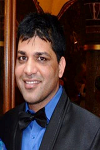
Balwant Rai
JBR Heath Education and Research Society
USA
Biography
Assoc. Professor (Dr) Balwant Rai is founder of Aeronautic Dentistry and has written the curriculum and guidelines for the implementation of this new discipline. He is Program Director and Associate Professor of Aeronautic Dentistry at KSU in the USA. He is also the President and Founder of the JBR Institute of Health Education Research and Technology. Dr Rai has multiple published articles in international and national journals, has written books, and is Editor-in-Chief of different international journals. He is also founder of the BR formula and BR regression equation used in forensic technology. His current work involves the effect of micro-gravity & simulated space analog environment on the oral cavity, human physiology and psychology and non-invasive biomarkers, including the elaboration of technologies to prevent the adverse effects of microgravity on the human physiology and psychology. His biography has been published in different books such as Who’s Who in Health and Medicine and Who’s Who in the World, USA etc. He is invited Editor of Mars Quarterly. He is an invited reviewer to NRF, South Africa, reviewer of more than 10 different journals, and has different pending patents. He is an invited reviewer of many national and international indexed journals. He is consultant of different companies. He was selected as part of Crew 78 on the Mars Desert Research Station [MDRS] as Health and Safety Officer and appointed as Commander for 100 B crew on MDRS. He is principal investigator cum researcher on a project entitled “simulated space mission and human factors including oral cavity: noninvasive technology and herbal formulationâ€. Dr Rai is working on a number of space related research projects and is jury member for different space related programs. He has a strong belief in leaving a mark on space programs using non-invasive diagnostic technologies and herbal formulations.
Abstract
Abstract : Human long duration space missions: Space dentistry, Medicine and Space policy
